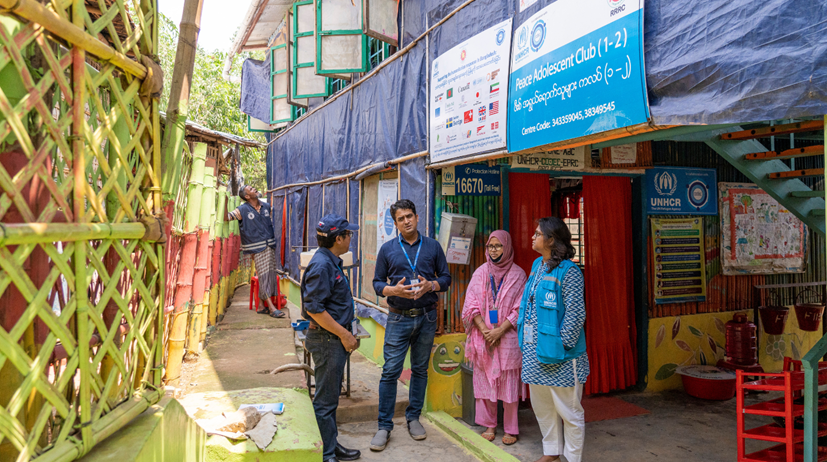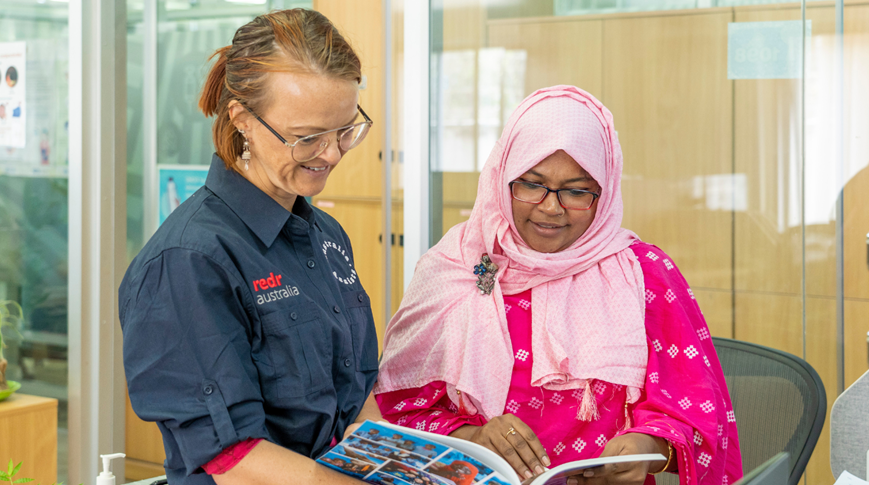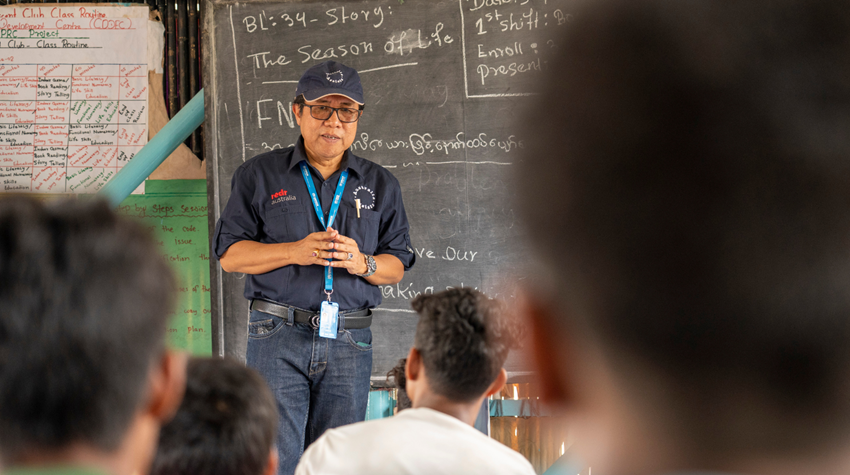The Australian Government is providing life‑saving humanitarian assistance for Rohingya and host communities in Cox’s Bazar. This assistance supports livelihoods aiming to increase self-reliance through education and skills development. The Australia Assists Program, supported by Australian Aid, continues to support social protection reforms, skills development, and gender equality to drive inclusive growth.
Through the Australia Assists Program, two deployees Budi and Melissa have been working specifically to ensure that Rohingya and host community children in Cox’s Bazar, Bangladesh, are supported through better child protection measures and education.
The Rohingya, a mostly Muslim minority from Myanmar, have been described by the United Nations as “the most persecuted minority in the world.” Rohingya refugees in Bangladesh are completely reliant on humanitarian assistance for protection, food, water, shelter and health. In Cox’s Bazar, the Rohingya have been living in temporary shelters in extremely crowded camps for five years.
As over half of the 948,000 Rohingya refugees in Cox’s Bazar are children, education services are an important way to give young people in the camps hope for the future as well as stronger education outcomes for local children. Australia Assists deployee Budi travelled to Cox’s Bazar as a UNHCR education officer, working to ensure that young people have access to meaningful learning opportunities, growth and purpose.
Budi has been assisting with the development of literacy, numeracy and life skills curriculum. “Life skills is decision making,” Budi explains. “How to make decisions, have a good attitude, and learning about early marriage, gender and preventing sexual exploitation and abuse (PSEA).”
“The lessons have had an impact on early marriage especially,” says Budi. “Youth in the camp sometimes 18 years old, already married; or 14 years old, already married. After getting life skills lessons, I ask them, ‘What about your plan to be married then?’ and they say ‘Oh, for boys, I have to be 21 years old, or 23 years old.’ Then I ask, ‘And for the girls?’ ‘Oh, after 18 years old.’ This is the valuable impact of the life skills lessons on people, I think.”
 Budi (left) with UHNCR colleagues outside an adolescent centre in the Rohingya refugee camp
Budi (left) with UHNCR colleagues outside an adolescent centre in the Rohingya refugee camp
Budi’s work with UNHCR on educational opportunities is helping to combat the risk of older Rohingya children and adolescents not having any means to pursue a sustainable future. Without the hope that ongoing education and socialisation provides, it would be extremely difficult for these young people to have any means to build a strong future beyond life in the refugee camp.
While essential services are being provided by the humanitarian sector, children remain vulnerable to disease outbreaks, malnutrition and limited education. In addition, the whole community is vulnerable to violence including gender-based violence, child labour, and as described by Budi, child marriage.
In this context, robust and effective social services are crucial.
Australia Assists Program deployee Melissa travelled to Cox’s Bazar as a Social Work Specialist with UNICEF to support Rohingya refugee children. Even before the refugee crisis, Cox’s Bazar was recorded as a community with high humanitarian needs in Bangladesh. The influx of Rohingya refugees since 2017 has increased the humanitarian needs significantly adding pressure on the host communities. Melissa’s work is helping to build the capacities of social workers supporting people in both the camps and host communities.
Melissa has been providing monthly technical sessions on child protection and case management to national social workers. Importantly, she has been strengthening the capacity of supervisors, so that they can now build on and facilitate these sessions themselves.
With Melissa’s support, the local social workers are now more confident and have strengthened capacity and skills to conduct their roles as child protection case workers. In addition, supervisors are more confident to lead the social workers that they supervise and to train staff in case management and child protection thematic areas. Together, Melissa and her counterparts are developing a procedure manual which will further support program and staff capacity.

Australia Assists deployee Melissa is a Social Work Specialist with UNICEF
While the work is important and rewarding, deploying to support the Rohingya refugee crisis can be very challenging. Melissa explained that where the humanitarian responders live, they can go to the beach and do activities to decompress, but life in the over-crowded camps is very different. It can be challenging to process simply by having so many more options and choices than the people who are in need of support.
“You can go into camps and have a bit of a hectic day or very confrontational day and then move back home and I can have a shower, I can even look out at the waves under the sunset,” says Melissa. “But when you're sitting in camp, and you're dripping with sweat, and you're hearing about someone's reality that they can't escape. It's the reason we're here, in terms of the response and who we're working with.”
The Rohingya crisis is now rolling into its sixth year, and Bangladesh hosts over 948,000 Rohingya refugees. Over fifty percent, or almost half a million of them, are children.
The Australia Assists Program, UNHCR and UNICEF are working together to support the Government of Bangladesh to respond to the needs of the most disadvantaged young people in the nation. Acknowledging with empathy and understanding the challenges, that too many people still face is hard. Australian Aid is a strong supporter of the alleviation of suffering of refugees and other disadvantaged communities around the world.


